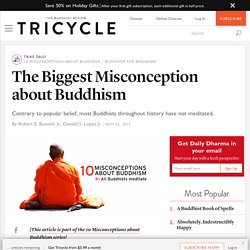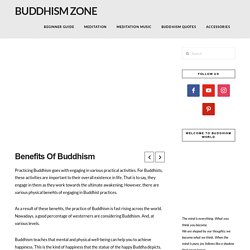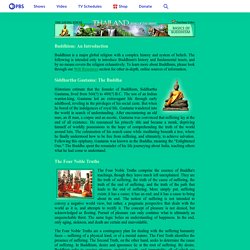

Top 10 celebrity Buddhists. When we started putting this list together it seemed like it was going to be nothing more than a shallow, trivial — although perhaps welcome — distraction from all the news about disastrous wars and sordid political scandals, but as we dug deeper into the web we found that we felt at times inspired by reading about the practice of famous Buddhists, some of whom have had their trials.

We hope that you too will be inspired — and entertained — by Wildmind’s Top Ten List of Celebrity Buddhists. Our criteria were simple. To be a celebrity Buddhist a nominee had to be alive, a celebrity, and — wait for it — a Buddhist (more on that later). And our voting process was simplicity itself; we counted the hits returned for an exact search on each name on Google. Well, that’s not too unscientific.
But to give ourselves some credit for our hard work and research abilities, it’s not always that easy to work out if a celebrity Buddhist is actually a Buddhist. 10. 9. Study: Most U.S. teens serious about religion. The majority of American teens believe in God and worship in conventional congregations, but their religious knowledge is remarkably shallow, and they have a tough time expressing the difference that faith makes in their lives, a new survey says.

Still, the notably comprehensive National Study of Youth and Religion concluded that “religion really does matter” to teens. The research found that devout teens hold more traditional sexual and other values than their nonreligious counterparts and are better off in emotional health, academic success, community involvement, concern for others, trust of adults and avoidance of risky behavior. The four-year effort was conducted by 133 researchers and consultants led by sociologist Christian Smith of the University of North Carolina at Chapel Hill. Smith reports the full results in the new book “Soul Searching: The Religious and Spiritual Lives of American Teenagers” (Oxford University Press), written with doctoral student Melinda Lundquist Denton.
Religion in America: U.S. Religious Data, Demographics and Statistics. What is the Biggest Misconception About Buddhism? That All Buddhists Meditate. The most common misconception about Buddhism is that all Buddhists meditate.

For over two millennia, Buddhists have made singular contributions to meditative theory and practice. Buddhist literature abounds in discussions about the stages of meditation, the prerequisites to achieving those stages, and the ways in which meditation serves to develop liberating insight. However, the majority of Buddhists throughout history have not meditated.
Traditionally a monastic practice, meditation was even then considered a specialty of only certain monks. Furthermore, it is only since the 20th century that meditation has been considered a practice appropriate to teach to laypeople. Related: Which Mindfulness? Indian Vinaya literature—the collected regulations for monastics—says next to nothing about how meditation practice might have been institutionalized within the major monasteries. At the end of Shariputra’s discourse, Anathapindada begins to weep. Related: Our Common Thread. Benefits Of Buddhism - Buddhism Zone. Practicing Buddhism goes with engaging in various practical activities.

For Buddhists, these activities are important to their overall existence in life. That is to say, they engage in them as they work towards the ultimate awakening. However, there are various physical benefits of engaging in Buddhist practices. As a result of these benefits, the practice of Buddhism is fast rising across the world. Nowadays, a good percentage of westerners are considering Buddhism. Buddhism teaches that mental and physical well-being can help you to achieve happiness. This suggests, therefore, that practicing Buddhism can benefit us mentally and physically. As a result, we are going to see the benefits of Buddhism in the different aspects of our daily living. Then, we are going to discuss on this page those Buddhist activities that will benefit us in many ways.
Thus, we are going to narrow our discussion down in the following subheadings: Mental Health Benefits Of Buddhism Mindfulness Meditation Thus: Christianity Vs Buddhism Beliefs: (8 Major Religion Differences) Suffering is at the heart of the Buddhist religion.

In fact, the “Four Nobel Truths” which many would consider the essence of all Buddhist teaching, are all about suffering (The truth of suffering, the cause of suffering, the truth at the end of suffering, and the true path that leads to the end of suffering). One could say that Buddhism is an attempt to answer the problem of suffering. Desire and ignorance are at the root of all suffering. And so the answer is to disassociate from all desire (attachments) and become enlightened by following the correct teachings of Buddhism. For the Buddhist, suffering is the most pressing question. Idol Worship Christianity The very first commandments in God’s law are to not have any idols before God and to not make carved images or bow down to them (Exodus 20:1-5). Buddhism That Buddhists worship idols (a Buddhist temple or monastery is full of carved images!) Basics of Buddhism. The Four Noble Truths The Four Noble Truths comprise the essence of Buddha's teachings, though they leave much left unexplained.
